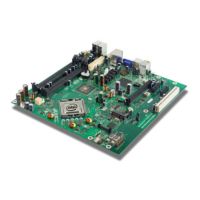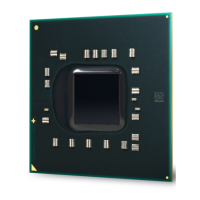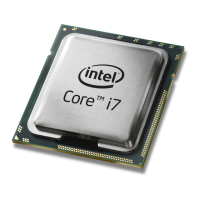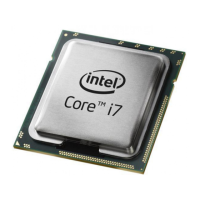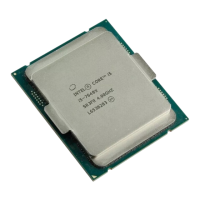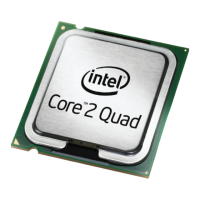32 Mobile Intel
®
945GM Express Chipset
Development Kit User’s Manual
Theory of Operation
In addition to the internal I/O connections listed above, the evaluation board also contains the
following I/O on the rear panel (as illustrated in Figure 3 on page 42).
• Five USB ports on back panel.
• VGA connector
• PS/2-style keyboard and mouse ports
• LAN connector
• One 9-pin serial connector
• One IrDA port
• One TV D-connector
3.4.3.1 PCI Express* Support
The evaluation board provides access to one x16 PCI Express* connector. Any industry standard
x16 PCI Express* video adapter may be used with this interface. The evaluation board also
provides access to two x1 PCI Express* connectors. Any industry standard x1 PCI Express*
adapter may be used with these interfaces.
3.4.3.2 SATA Support
The evaluation board provides support for up to two SATA disk drives. The SATA controllers are
software compatible with IDE interfaces, while providing lower pin counts and higher
performance.
These are two SATA connectors on the evaluation board. The SATA Cable connect provides both
signalling and power white the SATA Direct connect only provides signals (the user typically uses
an ATX power supply for the drive power).
3.4.3.3 IDE Support
The evaluation board has a 40-pin connector for the ICH7-M’s integrated IDE controller. This
connector supports up to two Ultra ATA/100 hard drives; one master and one slave.
Note: Desktop hard drives must be powered by an external ATX power supply.
3.4.3.4 USB Ports
The evaluation board provides five USB (2.0) ports on the rear panel and three additional ports
through headers (J6H2 and J7E2).
There are four UHCI Host Controllers and an EHCI Host Controller. Each UHCI Host Controller
includes a root hub with two separate USB ports each, for a total of eight legacy USB ports.
The EHCI Host Controller includes a root hub that supports up to eight USB 2.0 ports. The
connection to either the UHCI or EHCI controllers is dynamic and dependant on the particular
USB device. As such, all ports support High Speed, Full Speed, and Low Speed (HS/FS/LS).

